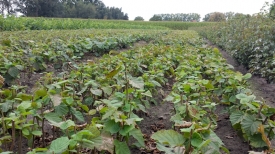News
2014-09-26
Visit of the plants nursery Op de Beeck
LIFE Elia team visited the plants nursery Op de Beeck on September 26th 2014 near Mechelen. This is the place where the young plants are growing before their plantation in our edges and orchards. The Op de Beeck family manages around 75 hectares since 1832, involving 6 generations of father to son heritage.
Seed harvest, partnership with the Seed Office and seedlings in nursery
Following our harvest of seeds from secondary forest species (done by the team), we concluded a partnership with the Seed Office from the Walloon Region. The Seed Office was in charge of the seeds breaking of dormancy.
Seeds were then transported to the plants nursery Op de Beeck where they are sowed, or else in our nurseries.
After a period of growth of 1 to 2 years guarantying a higher percentage of picking up once planted on site, the team is taking back the plants for the plantation.


A long-standing know-how
We had the chance to see growing plants nurseries up close. Seeds were sowed for a period of one year. Then small plants are then transplanted for another one or two year's period, before being available for plantation on site. No doubts that techniques used in the nursery is relying on a long-standing experience !




Local origin for our secondary forest species
Our LIFE project deals with local indigenous species. For the harvest of seeds from first-class production species (beech, Douglas fir...), the sector is well developed, but few has been done for secondary species. In Flanders, the concept "Plant van hier" is already working and is validated by the forest administration ANB. Seeds are harvested by social economy companies. For most new building permits for which plants have to be planted, there is the obligation to comply with certifies local origin.

Plants nurseries offer : uncertainties leading to a opportunities
Commercial nurseries often sell plants from countries having low cost workforce. Majority of hawthorns sold are from Italy, whereas hazels come from Turkey. A brand new sector is conceivable in the Walloon Region, and its sustainability could be given a boost by establishing a legal and incentive frame.
The LIFE Elia project and creation of standing seed banks
The biggest constraints in the harvest process are the low quantities and the distance between two harvest locations. By planting edges and orchards with these species under overhead lines, this difficulty will be partially solved by the LIFE project.

Op de Beeck, a motivated partner
The nursery Op de Beeck has proved its ability to provide us with a high number of certified plants in the short time schedule of the project (2011-2016). Production methods, traceability and the quality of the plantation follow-up make us sure that we can reach the objective of a project "100 % indigenous" with this enthusiastic partner.










